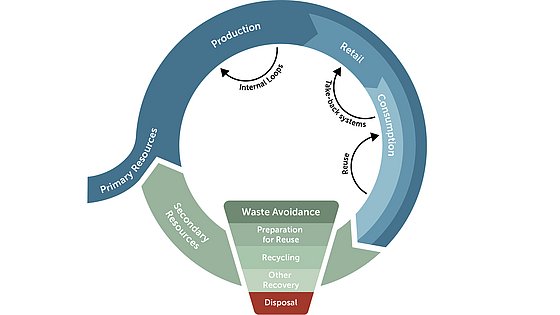Sustainable and recyclable construction

Guiding principle of the circular economy
The building sector is responsible for more than half of the annual waste volume and contributes strongly to the fact that the naturally generated resources of the earth are used up arithmetically earlier and earlier each year. To counteract this trend, the raw materials bound in buildings must be returned to a product cycle through so-called urban mining.
New buildings should be constructed in such a way that there is a high potential for closed recycling loops in the technical or biotic cycle. The German Waste Management Act establishes a hierarchy according to which waste is to be avoided or managed:
- Avoidance
- Preparation for reuse
- Recycling (and downcycling)
- Other recovery
- Disposal
To make buildings more sustainable, there are three sustainability strategies; efficiency, sufficiency and consistency. The Solar Decathlon Europe has so far pursued the efficiency strategy in past competitions mainly through energy measures. Due to the direct dependence on the other competition disciplines, this one-sidedness could not be completely eliminated by the new discipline of sustainability introduced in 2010.
However, the examination of selected competition entries from the SDEs 2010 to 2019 was able to show that some teams have already successfully managed to implement sufficiency and consistency strategies. The restructured sustainability discipline of the SDE 21/22 competition builds on these experiences and challenges the participants through two new Sub-Contests:
- The Sub-Contest “Circularity” involves assessing the loop potential of building construction through the newly introduced “Urban Mining Index” tool.
- The Sub-Contest “Sufficiency, Flexibility and Environmental Sustainability” covers sufficiency and consistency strategies in the areas of biodiversity, society, microclimate, durability and materials.
Further reading
- Destatis (2018) Abfallbilanz 2016 - Abfallaufkommen/-verbleib, Abfallintensität, Abfallaufkommen nach Wirtschaftszweigen.
- Umweltbundesamt (2019) Earth Overshoot Day 2019 [online]. https://www.umweltbundesamt.de/themen/earth-overshoot-day-2019-ressourcenbudget [Accessed on: 23. Aug. 2019].
- Müller, F. et al. (2017) Urban Mining - Ressourcenschonung im Anthropozän [online]. https://www.umweltbundesamt.de/sites/default/files/medien/1968/publikationen/ uba_broschuere_urbanmining_rz_screen_0.pdf [Accessed on: 27. Sep. 2020].
- Deutscher Bundestag (24.02.2012) Gesetz zur Förderung der Kreislaufwirtschaft und Sicherung der umweltverträglichen Bewirtschaftung von Abfällen (Kreislaufwirtschaftsgesetz - KrWG) - KrWG.
- Hillebrandt, A. et al. (2018) Atlas Recycling - Gebäude als Materialressource. München: Edition Detail.
- Rosen, A. (2021) Urban Mining Index - Entwicklung einer Systematik zur quantitativen Bewertung der Kreislaufkonsistenz von Baukonstruktionen in der Neubauplanung. Stuttgart: Fraunhofer IRB Verlag.
- Gebäudeenergie-Wettbewerb & Living Lab Wissensplattform [online]. Bergische Universität Wuppertal Lehr- und Forschungsgebiet Bauphysik und technische Gebäudeausrüstung. https://building-competition.org/ [Accessed on: 26. Nov. 2020].
